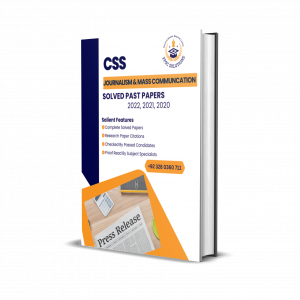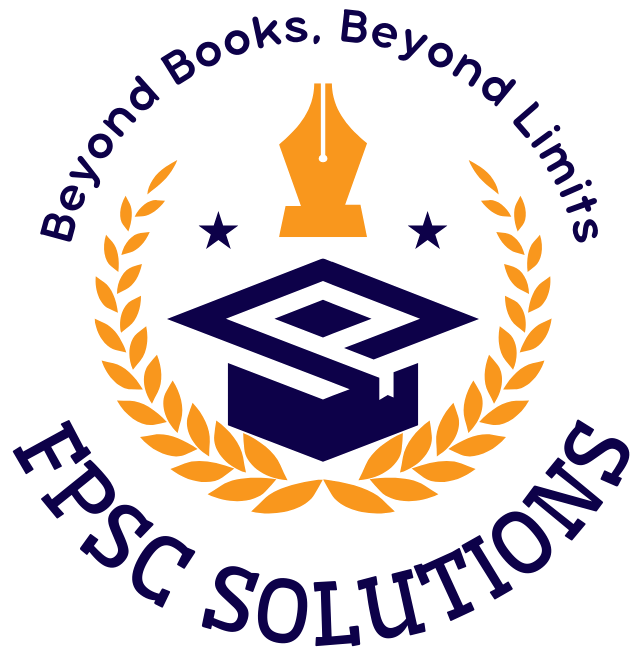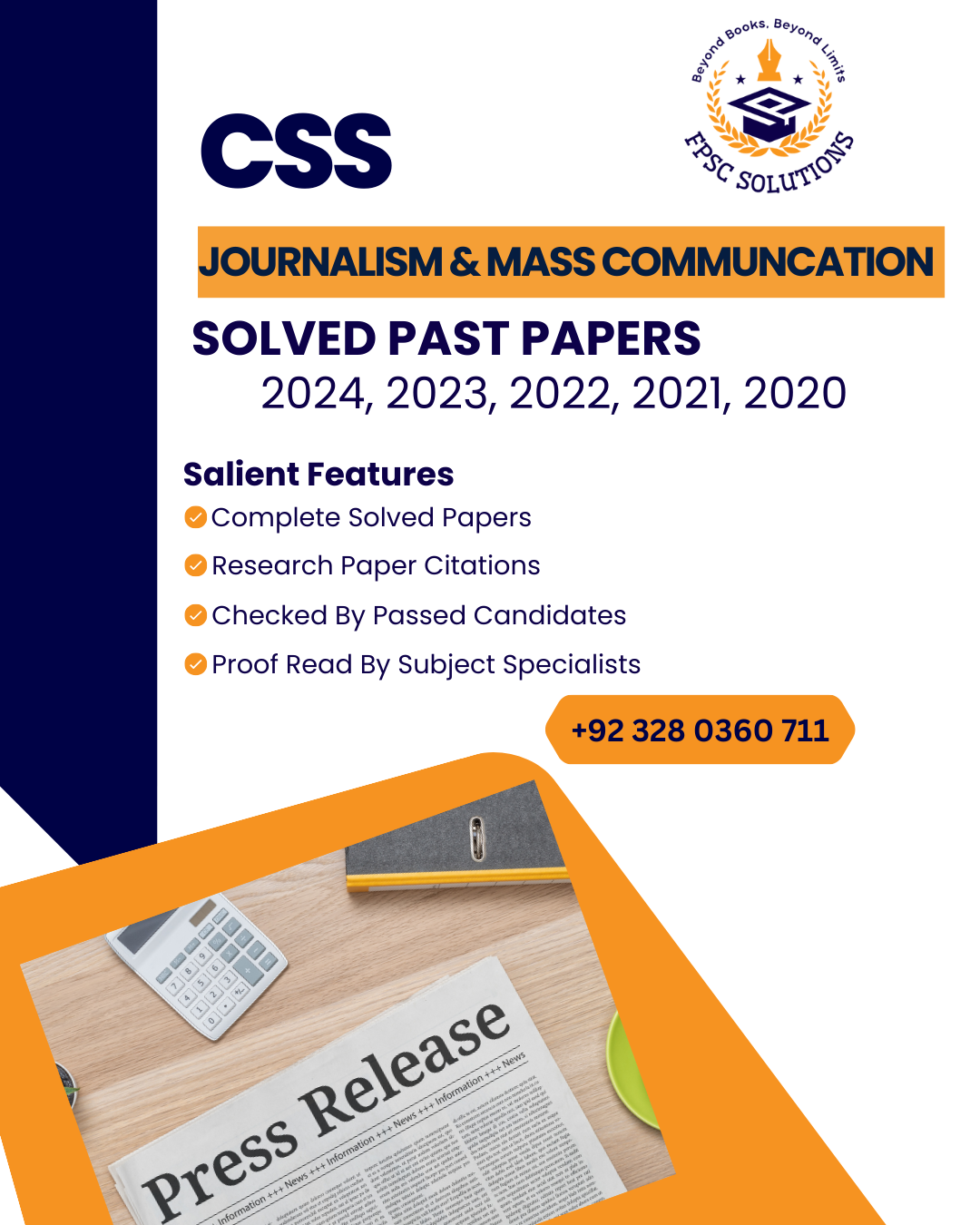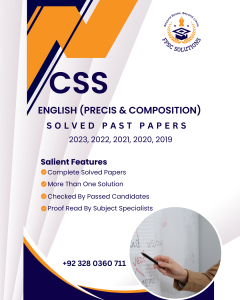The CSS exam is the most significant in Pakistan as it allows candidates to enter the civil service, which plays an important role in governance and public administration. CSS Journalism and Mass Communication subject is very important in this exam because it allows students essential skills for effective communication, critical thinking, and understanding of the media’s role in society, which are important for civil service roles.
The CSS JOURNALISM & MASS COMMUNICATION 2020 paper solution is designed to assess candidates’ understanding of complex media dynamics and their implications on society. This article will provide a comprehensive guide to the 2020 solved paper, offering preparation material, addressing the key questions, and offering insights into effective essay writing strategies for each question. With this approach, students can gain a clearer insight into the exam’s expectations and significantly improve their preparation strategy.

CSS Journalism and Mass Communication Past Paper 2020
Q1. After defining the centrifugal and centripetal effects of mass communication, critically discuss how the Pakistani media helped or hindered the formation of diverse groups and identities based on subculture, opinion, social experience, and social action.
Q2. What is the conflict or trade-off between national sovereignty and the free flow of information?
Q3. Describe how new technologies (such as video streaming and 3-D TV) will affect the television industry.
Q4. Does the Pakistani soap empower women in any way, or does it provide another means of ideological containment?
Q5. “The public criticism and perceived lack of credibility does not appear to be affecting the operations of the big media groups and the careers of top anchors.” If we consider this statement true, then how would it affect the future of journalism in Pakistan?
Q6. What is development journalism and how is it different from development support communication?
Q7. What are the salient features of the Prevention of Electronic Crimes Act (PECA)? How it can affect the freedom of expression on digital platforms?
CSS JOURNALISM & MASS COMMUNICATION 2020 Solved Paper Insights
-

CSS JOURNALISM MASS COMMUNICATION SOLVED PAST PAPERS 2024, 2023, 2022, 2021, 2020
₨ 999 – ₨ 2,999Select options This product has multiple variants. The options may be chosen on the product page
Writing Answer for Each Question
Q1. After defining the centrifugal and centripetal effects of mass communication, critically discuss how the Pakistani media helped or hindered the formation of diverse groups and identities based on subculture, opinion, social experience, and social action.
To write an effective essay on this question, start by defining centrifugal (forces that push groups apart) and centripetal (forces that bring groups together) effects in mass communication. Discuss how Pakistani media has played a dual role in shaping diverse identities through subcultures and social experiences. Use specific examples to illustrate both positive and negative impacts, concluding with a balanced perspective on the media’s influence.
Q2. What is the conflict or trade-off between national sovereignty and the free flow of information?
Begin by explaining the concepts of national sovereignty (the right of a nation to govern itself) and the free flow of information (the unrestricted exchange of information). Analyze the conflicts that arise when national interests clash with global communication standards. Provide examples from current events where this trade-off has been evident, emphasizing its implications for policy-making in Pakistan.
Q3. Describe how new technologies (such as video streaming and 3-D TV) will affect the television industry.
Discuss how emerging technologies like video streaming and 3-D TV are transforming the television industry. Highlight the shift from traditional broadcasting to on-demand services, focusing on how this affects content creation, viewer engagement, and advertising strategies. Consider both the opportunities and challenges these technologies present for Pakistani broadcasters.
Q4. Does the Pakistani soap empower women in any way, or does it provide another means of ideological containment?
Evaluate whether Pakistani soaps empower women or serve as tools for ideological containment. Present arguments from both sides, using specific examples from popular shows. Discuss themes portrayed in these soaps and their societal implications, ultimately forming a conclusion based on your analysis.
Q5. “The public criticism and perceived lack of credibility does not appear to be affecting the operations of the big media groups and the careers of top anchors.” If we consider this statement true, then how would it affect the future of journalism in Pakistan?
Reflect on the statement regarding public criticism of major media groups and its implications for journalism’s future in Pakistan. Discuss factors contributing to this phenomenon, such as audience trust issues and media accountability. Explore potential changes in journalistic practices that may arise from this environment.
Q6. What is development journalism and how is it different from development support communication?
Define development journalism (journalism aimed at promoting social change) and differentiate it from development support communication (strategies that assist development initiatives). Discuss the importance of each approach in fostering informed public discourse and supporting national development goals.
Q7. What are the salient features of the Prevention of Electronic Crimes Act (PECA)? How it can affect the freedom of expression on digital platforms?
Outline the key features of PECA, focusing on its objectives to combat cybercrime while safeguarding digital expression. Analyze how these regulations impact freedom of expression online, providing examples of cases where PECA has been invoked.
In conclusion, preparing for the CSS JOURNALISM & MASS COMMUNICATION 2020 paper requires a thorough understanding of complex media issues and their societal impacts. By engaging critically with each question, students can develop well-structured essays that reflect their analytical abilities and knowledge of current affairs relevant to Pakistan’s media landscape.


